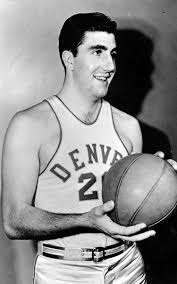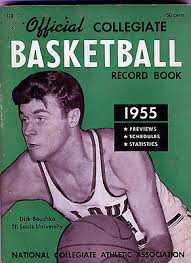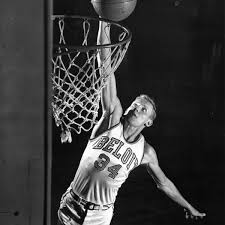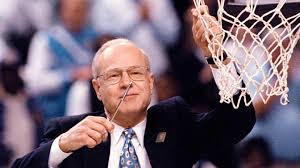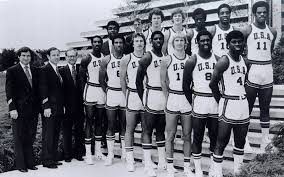The NBA Finals date back to 1947 (when they were known as the Basketball Association of America Finals) and the very 1st NCAA tourney was held in 1939. Olympic basketball competition is even older: it debuted as a demonstration event in 1904 and the men’s version became a medal sport in 1936, with the women finally getting their chance to go for the gold in 1976. The United States has dominated Olympic basketball competition from the start: the men have won 15 gold medals in the 18 tournaments they have participated in during the past 84 years, while the women have won 8 gold medals in the 10 tournaments in which they have competed during the past 44 years. Those of you who were looking forward to the 2020 Olympics opening ceremonies in Tokyo on July 24, 2020 will have to wait an extra 364 days, as the coronavirus caused a postponement until July 23, 2021. Due to the absence of college basketball since mid-March, HoopsHD’s Jon Teitel decided to fill the void by trying to interview as many prior Olympic players/coaches as possible so that you have something to read this summer while not watching the Summer Games. We continue our coverage by chatting with Sam Perkins about winning an NCAA title in 1982 and a gold medal in 1984. Today marks the 36th anniversary of Sam having 14 PTS/3 BLK in a 104-68 win over Uruguay in Olympic round-robin pool play.
In the 1982 NCAA title game you scored 10 PTS in a 1-PT win over Georgetown: did you think that Michael Jordan’s game-winning shot was going in, and what did it mean to you to win a title? We were so into the game that his shot had to go in: we had no other option besides James Worthy. Jimmy Black found Michael wide-open after the Hoyas’ defense had shifted so much to the strong side. It looked dead-center to me so I felt glad when it went in.
In April of 1984 you showed up for the Olympic trials at Indiana University with 73 other players, and after cutting the squad to 20 by the end of week 1 you saw Charles Barkley/John Stockton/Terry Porter get cut in May and Johnny Dawkins/Chuck Person get cut in June: how difficult was it to impress Coach Bob Knight, and did you think that you would make the final cut after seeing so many other great players being sent home? I was kind of surprised because everyone I had heard about in college was there. We were all on different courts so after seeing those great guys get cut I realized it was a real tryout. I remember CM Newton telling me that I had to pick it up even though I thought that I was playing well so I was fortunate to make that team.
You were 1 of 4 consensus 1st-team All-Americans from that season who made the final roster (along with Jordan/Patrick Ewing/Wayman Tisdale) and you even had another future Hall of Famer as a teammate (Chris Mullin): what was your reaction when you walked into the 1st day of practice and just looked around at all of that talent? It was surreal at the time to be a part of something that I never thought I would. To see so many other great players was a great compliment to our college careers. When Coach Knight showed up he had great applause for all of us so I thought that I was on the right track.
After the final roster was selected you went out on the road for a coast-to-coast tour of 9 scrimmages against NBA players: how were you able to go 9-0 as a bunch of college kids facing a bunch of pros, and what was it like to play at the Hoosier Dome in front of 67,000 fans? It was crazy at the Hoosier Dome. To string together 9 wins was part luck/part skill but we were hungry/focused while playing for team USA. We knew that the challenges would be great and that we would face great competition in the Olympics. We played hard in those 9 games: the NBA guys were trying to stay in shape and we were just trying to get over the hump after beating each other up in practice.
You were eventually named co-captain of team USA and scored 12 PTS in a 96-65 win over Spain in the gold medal game: what did it mean to you to represent your country, and what did it mean to you to win a gold medal? It meant a great deal to me because it complimented my 4 years of college. It was another accolade that I really appreciated. To win a gold medal with guys I had so much respect for was worth the ride. I am glad to have had a hand in that and it was an experience that I will never forget.
On April 12, 1990 you scored a career-high 45 PTS/19-26 FG/13 REB/7 AST for Dallas in a 7-PT win at Golden State: where does that rank among the best all-around games of your career? It was a night where everything seemed to go in. I was ready to play but am not sure what got into me. I almost busted my hand on the rim from slamming the ball in so hard 1 time. I did not realize how many PTS I had until halftime: Coach Dick Motta said he did not realize I was a scoring machine after getting 27 in the 1st half! Nobody would ever dream that I could score that many on that team. Coach told me to just go out and play and not let anyone hold me back. It was all within the flow of the game rather than being a selfish thing.
On January 15, 1997 you scored 26 PTS and tied an NBA record by making all 8 of your 3-PT shots for Seattle in a 44-PT win over Toronto: was it just 1 of those scenarios where every shot you put up seemed to go in because you were “in the zone”? There is a story behind that game. I woke up late that day and only arrived 1 hour before the game so I did not get to practice my pregame shots. I was worried that I did not have a good stretch/routine as I came into the game off the bench: my 1st shot went in and I could not believe it. The game stayed like that all night long: I only took 8 threes but they all went in. My teammate Detlef Schrempf said “Don’t miss” because he wanted me to get the record but after he told me it was on my mind. I heard Raptors coach Darrell Walker say “Do not let Sam get the ball” but my coach tried to get me the ball before he eventually took me out. Going 8-8 was so special that it became my music production company name: “8 for 8”!
You appeared in 3 NBA Finals with 3 different teams during a 10-year span from 1991-2000: did you get sick of seeing Coach Phil Jackson every June (since he beat you each time)!? Yes. The last time we crossed paths coming off the court and he just shrugged his shoulders. There is no reward for finishing 2nd but it was a memorable experience to get to the Finals so often. There are plenty of guys who could have taken my place but I had fun. I wish that I could have won 1 but that is how it goes. I thought the Lakers were my best chance of getting 1 but we did not fare well against the Bulls. Seattle/Indiana also tried to get over the hump but we could just not get past Phil.
You later became a member of the Board of Directors of the Special Olympics: why did you decide to join the board, and which of your former fellow Olympians impressed you the most (Nadia Comaneci/Donna de Varona/Michelle Kwan/other)? I joined the Board after someone saw that I was doing some work through school at UNC and in the NBA. I always took time out to do something for Special Olympics and they invited me to attend some games. I thought the relationship would be great after I advocated for people with intellectual disabilities. I remain an ambassador for them, continue to promote awareness, and am a conduit to other people to generate more interest. I finally met Nadia but was more interested in meeting Maria Shriver (whose mother Eunice Kennedy Shriver founded the Special Olympics in 1968): I could not believe it when I showed up 1 time and she was actually sitting next to me! I also got to know Michelle Kwan and we talked a lot: she is really tiny (5’2″) and we often sat together at board meetings.
You remain part of the last amateur US basketball team to win an Olympic gold medal: do you think that we will ever go back to using college players, and do you think that we should? The way things are set up they will probably continue to use pro players. The NBA is getting younger and has a lot of talent. There was 1 year that we had high hopes before Argentina beat us in the 2004 semifinals and it just messed up our progress. I do not think that we will use amateur players again because a lot of college players are 1-and-done or have other options so I do not think USA Basketball would want to rely on them. When the stars leave and the remaining players are not ready to be stars it is not the best option.
Are there any thoughts you would like to share about everything that has been going on in our country recently (George Floyd/protests/police/other)? In recent months we have seen surmountable change in everyone’s attitude. The thing that stands out to me was people of many races witnessing such a heinous crime to an innocent Black man. Prior to that we saw a young man get shot while jogging and another woman killed while sitting in her own apartment. It has generated rage in so many people of all nationalities because they took it personally. You see the outpouring of support from state to state and even from some foreign countries. It showed that the paradigm has changed just slightly and the energy is focused on legislative reform. We see so much hate from people who resist but we have no reason not to get along. When you cannot find an answer for why some White people hate Black people, you realize that we have had deluded information for too long and we should just stop and think. We must reflect on our actions and what is about to happen. We have a person in office who is trying to preach hate/separatism and everyone’s soul has been hurt. We have to take a stand and not let it happen over and over again. There is a lot of good will/desire to get along and it will turn around eventually.



